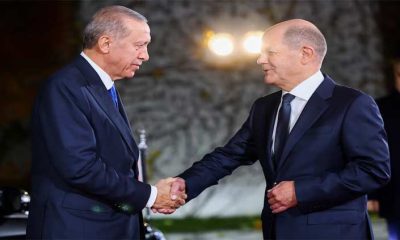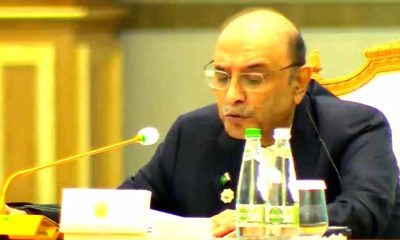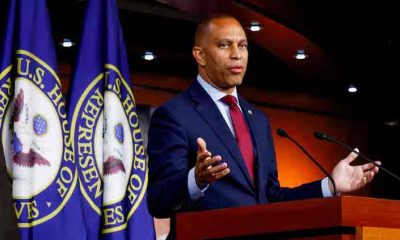Business
IMF projects 3pc economic growth for Pakistan

Pakistan’s economic growth is expected to remain at 3 percent during the current fiscal year, according to the IMF’s latest World Economic Outlook Report.
The report forcasts a 4 percent economic growth rate for Pakistan in the next fiscal year.
Meanwhile, India’s growth rate is predicted to be 6.5 percent for both the current and the next fiscal year.
For the United States, the report estimates a 2.7 percent growth rate this year, declining to 2.1 per cent in the next fiscal year.
China’s economic growth is projected at 4.6 per cent for the current year and 4.5 per cent for the next year.
The United Kingdom’s economy is expected to grow by 1.6 per cent this year, with a slight dip to 1.5 in the next fiscal year, the report stated.
Business
US inflation relief dents dollar, yen gains ahead of BOJ

The dollar slipped on Thursday to stand just off recent peaks as cooling US inflation data knocked down bond yields, while the yen hit a one-month high on rising bets on a rate hike in Japan.
The yen was the biggest major mover on the dollar overnight, rising about 1% and extending gains in Asia, as inflation relief in the US raised chances of Federal Reserve rate cuts and coincided with murmurs of a Bank of Japan hike next week.
The yen traded as firm as 155.21 per dollar, its strongest since Dec. 19. The greenback also handed back some recent gains against the Australian and New Zealand dollars and the Aussie hit a one-week high of $0.6248 in the Asia morning.
The euro ended up fairly steady and was last buying $1.0298. The dollar index was heading lower for a fourth straight session on Thursday, easing slightly to 109.02.
Foreign exchange markets made little direct reaction to the announcement of a ceasefire deal in Gaza, though the Israeli shekel did touch a one-month high.
Core US inflation was 0.2% month-on-month in December, in line with forecasts and below November’s 0.3%. Annualised, the 3.2% reading was cooler than the expectation for 3.3%. That followed a similarly softer-than-expected British inflation reading and remarks from a Bank of England policymaker saying the time was right to bring down interest rates.
Traders who have been growing worried about inflation responded with relief, buying stocks and sending benchmark 10-year Treasury yields down more than 13 basis points, although the currency market reaction was a bit more muted.
The dollar index remains 0.5% firmer in January and, if sustained, would notch four consecutive monthly gains. Markets priced in about an extra 10 bps of Federal Reserve easing this year after the inflation data, reckoning on 37 bps of cuts.
“Of course, the dollar has overshot rate spreads lately,” said Deutsche Bank macro strategist Tim Baker in a note.
“But it’s not all that large,” he said. “The dollar should build in risk premium given the geopolitical backdrop.
“Further,” he said, “it’s also completely normal to see dollar strength like this when U.S. growth is outperforming peers to this extent – and in previous episodes the dollar has overshot this relationship.”
Markets have a wary eye on Donald Trump’s inauguration day on Monday for a slew of executive orders, especially on tariffs, that are likely to roil asset prices and the dollar.
“USD strength may partly reflect Trump 2.0 (tariff) fears,” said Mizuho economist Vishnu Varathan.
China’s yuan, seen on the front lines of tariff risk, hardly caught a break and was near the weak end of its trading band at 7.3312 in early trade.
The New Zealand dollar, at $0.5623, is still near Monday’s two-year low of $0.5543 and the Aussie remains within reach of a recent five-year low, receiving only a brief boost from robust employment figures on Thursday.
Sterling dipped slightly to $1.2233 in Asia and there was not all that much relief for smaller currencies.
Indonesia’s rupiah had made a six-month trough on Wednesday following a surprise rate cut from Bank Indonesia. South Korea’s won did not take much of a boost, either, from the central bank defying expectations for a cut to leave its benchmark rate on hold at 3% on Thursday.
Besides the beginning of Trump’s presidency, markets are looking ahead to Chinese growth figures due on Friday and to a Bank of Japan meeting next week.
Recent remarks from BOJ Governor Kazuo Ueda and his deputy Ryozo Himino have made clear that a hike will at least be discussed and markets have priced about a 74% chance of a 25 basis point rise in short-term rates to 0.5%.
Business
Oil rises as US inventory declines heighten supply concerns

Oil prices rose for a second day on Thursday after a larger-than-expected decline in US crude oil stockpiles added to supply concerns stoked by US sanctions against Russian energy trade.
Brent crude futures rose 30 cents, or 0.4%, to $82.33 per barrel by 0120 GMT, after rising 2.6% to its highest since July 26 in the previous session. US West Texas Intermediate crude futures rose 32 cents, or 0.4%, to $80.36 a barrel after gaining 3.3% on Wednesday, reaching its highest since July 19.
Prices rose after the US Energy Information Administration reported on Wednesday domestic crude oil stocks fell for the seventh time in a row last week, the longest declining streak since July 2021.
Global crude oil supplies are expected to tighten in the months ahead as fresh US sanctions on Russian oil producers and tankers have sent Moscow’s top customers scouring the globe for replacement barrels, while shipping rates have surged too.
The latest round of sanctions could disrupt Russian oil supply and distribution significantly, the International Energy Agency said in its monthly oil market report on Wednesday.
The Organisation of Petroleum Exporting Countries and its allies, which have been curtailing output over the past two years, are likely to be cautious about increasing supply despite the recent rally in prices, said Commodity Context founder Rory Johnston.
“The producer group has had its optimism dashed so frequently over the past year that it is likely to err on the side of caution before beginning the cut-easing process,” he said.
Limiting oil’s gains, Israel and Hamas agreed to a deal to halt fighting in Gaza and exchange Israeli hostages for Palestinian prisoners, according to an official.
Business
Finance Minister Aurangzeb discusses bilateral cooperation with Japanese envoy

Federal Minister for Finance Muhammad Aurangzeb and Ambassador of Japan Akamatsu Shuichi on Thursday discussed economic reforms, bilateral relations and opportunities for enhancing economic cooperation.
Minister Aurangzeb welcomed Ambassador Akamatsu, who called on him here, upon assuming his diplomatic duties in Islamabad and appreciated Japan’s long-standing partnership with Pakistan, said a statement issued by the Ministry of Finance.
The finance minister briefed the Japanese ambassador on the Pakistan’s macroeconomic stability, taxation, special economic zones, and ongoing reforms in the energy sector.
Minister Aurangzeb stated that the government was determined to continue its reform agenda, with a focus on issues such as population growth and the risks posed by climate change.
-

 pakistan3 months ago
pakistan3 months agoPunjab govt imposes Section 144 in five districts
-

 World3 months ago
World3 months agoGermany’s Scholz to discuss Middle East, Ukraine with Erdogan in Istanbul
-

 Business2 months ago
Business2 months agoAuto industry’s shift toward EVs is expected to go on despite Trump threat to kill tax credits
-

 Entertainment2 months ago
Entertainment2 months agoBeyoncé leads the 2025 Grammy noms, becoming the most nominated artist in the show’s history
-

 pakistan3 months ago
pakistan3 months agoPakistan shares exemplary bond with Turkmenistan: President Zardari
-

 Business2 months ago
Business2 months agoWall Street cruises toward the close of its best week in a year
-

 Sports3 months ago
Sports3 months agoHome hopes Zheng and Wang through to last-eight in Wuhan Open
-

 World2 months ago
World2 months agoSix Israeli troops killed, deadly strikes in Lebanon


















